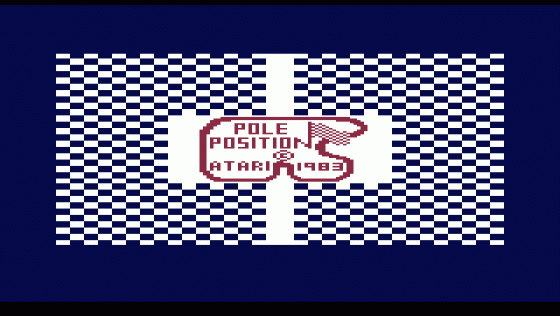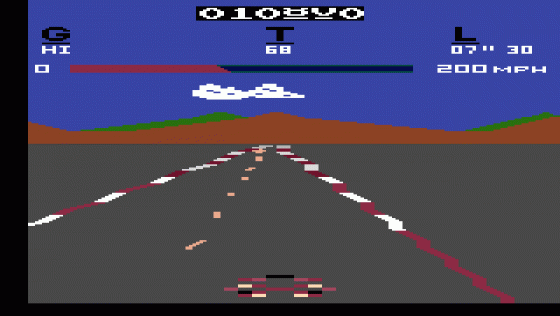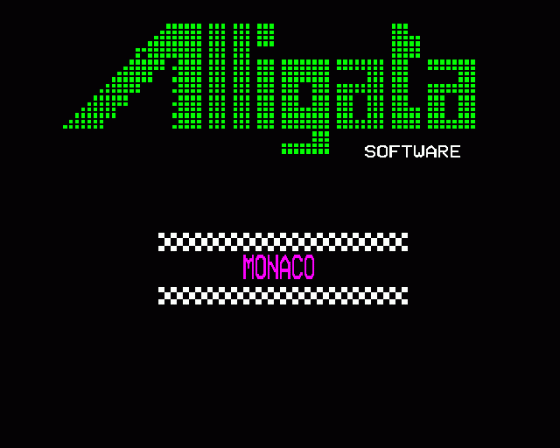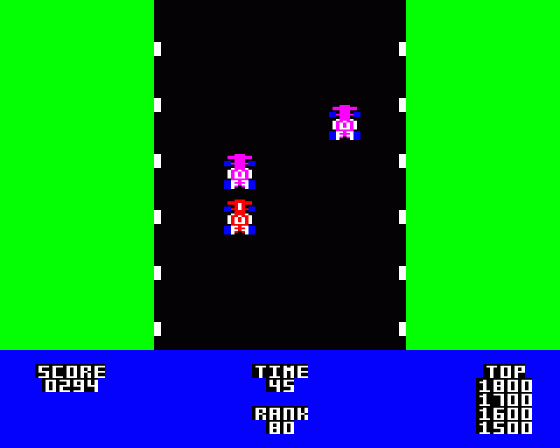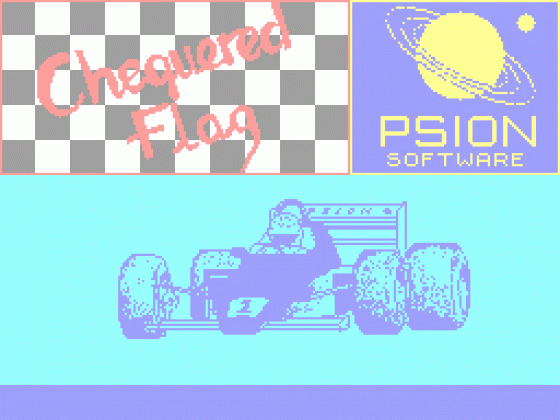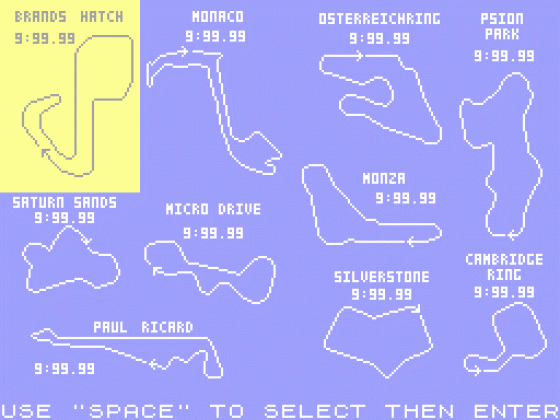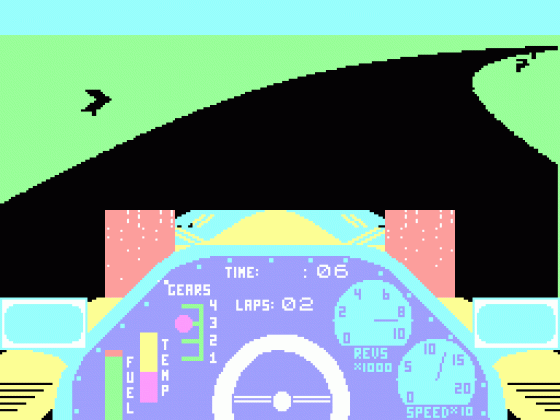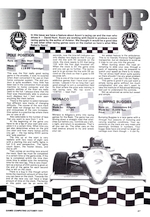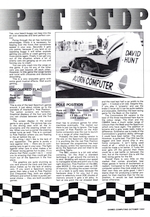
Games Computing
 1st October 1984
1st October 1984
Pit Stop
In this issue we have a feature about Acorn's racing car and the man who drives it - David Hunt. Acorn are working with David to produce a motor racing game by the author of Aviator. We thought it would be a good idea to see what other racing games were on the market so here's what Mike Roberts found.
Pole Position
This was the first really good racing game in the arcades, it was no surprise when Atari converted it for use on their home computer system. The end product is quite excellent. Very little has been lost in the conversion from arcade machine to home computer and the graphic abilities of the Atari are really used to the full. I always knew that the Atari was theoretically able to produce such displays but I had never seen anything like them before.
There is the option to select between four different race tracks of changing difficulty. The course of the race track itself does not change but the number and viciousness of the cars increases. One option is a practice lap where there are no cars at all.
Also selectable is the number of laps that you want to race from 1 to 8.
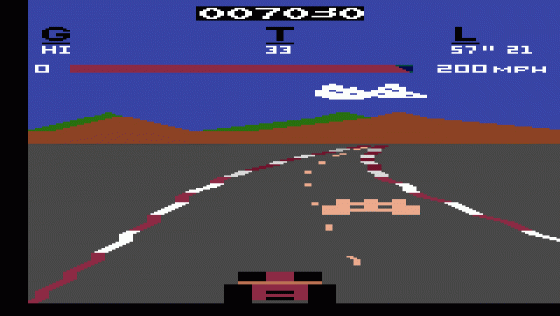
At the beginning of the game you have to do a lap of your own and complete it in a certain time. What time you get also determines where on the grid you start and how many bonus points you get - the top being 4000 points and 'pole position'.
The line up at the start is very realistic with two rows of eight cars with a starting line and traffic lights in full 3-D and perspective. The lights count down, the hooter blows, and they're off!
Then comes an exciting race around the track. Each lap must be completed in a certain time or the game ends. If the lap is completed within the time then more time is added onto the remaining time for the next lap. This is very important as a bonus of 200 points is given at the end of the game for each second that is left on the clock.
There is a bug in this though which limits the maximum amount of time that you can have on the clock. Towards the end of the race you can have a large amount of time on the clock. The bonus at this point can be an extra 60 seconds, now the time left indicator can only display two digits so that if you go over the line with 40 seconds on the clock, the clock resets to 00 that being 100 with the first digit knocked off. When the clock is 00 the game ends and you can go no further. The technique is to go across the line with 39 second on the clock so that it goes to 99 seconds left.
This is one of the most enjoyable and addictive games that I have ever come across. I played it for so long that I got good enough to win a competition held by Atari where the prize was training in real racing cars. My top score is 10,750 - beat that!
Monaco
Monaco is Alligata's entry into racing games for the Beeb. The game has you driving down a straight road that stretches out before you. Controls are z left, x right, and return to accelerate. That's all you can do. The other cars on the road swerve around to try and wreck your car.
An added feature is the ambulance. This is no friendly Florence Nightingale transporter, but an obstacle to avoid as it tries to run you into the ground.
When burning down the road attempting to slide your way through a pack of opposing cars, be prepared to watch your speed as there is no brake. The car slows itself down quite quickly so there shouldn't be any great problem with speed - just don't be too flashy.
This game is good if you just want a simple racing game without too much complication and you don't want to take the Institute of Advanced Motoring test just to understand the controls.
Not as advanced as some but sweet and simple.
Bumping Buggies
Bumping Buggies is a race game with a through four seasons of motoring and varying weather conditions. Your opponents on the track are very mean and seemingly limitless in numbers. Your buggy does have one small (or large) advantage over them though - it can fly. Yes, your beach buggy can leap into the air over obstacles and land perfect control.
Flying through the air has numerous advantages. Firstly it is necessary for leaping over the rivers that sometimes appear in your way. Secondly it gets you points, because if you land on an opposing buggy it will either explode gaining you points or crash gaining you more points again. Finally it can get you out of the situation where a lot of enemy cars are ganging up on you and forcing you to crash.
You can only crash into the verge on this game. If you hit any of the other cars you just bounce off each other. However, in this game the verge twists and turns with chicanes and obstacles abounding.
This is a very enjoyable game with some good musical effects. Well worth getting.
Chequered Flag
This is one of the best Spectrum games around, it just about comes up to the standard of Atarisoft's Pole Position. The option screens are fantastic. Graphical displays of the four cars that you can choose between and the five tracks.
The screen display in the actual game is very good. The picture has you in the driving seat with all the instruments and the steering wheel visible. When you turn a corner the steering wheel turns as well. This is in contrast to Pole Position where you are floating in the air behind the car.
One thing I don't like is the lack of any opposition. The game is purely a race against time - there are no competing cars to get in your way. The fight against other cars is what makes a lot of lesser racing games fun to play, it's a shame that Psion couldn't do it - mind you it's amazing that they could get this much out of the Spectrum it the first place!
The graphics are quite stunning as you race around the track and this just about makes up for the lack of enemy cars. If you want a Spectrum racing game then take a look at Pole Position and Chequered Flag, both are slightly different and which is best is purely personal choice - they are both excellent games.
Pole Position
Atari has to produce games for other machines eventually. The market out there is just too big to ignore. The huge success of Pole Position on the Atari home computers was the cue to launch it on a range of other machines.
Probably the best looking version is the one on the Spectrum. Not because it is anything like the real Pole Position but because the programmer has kept the display within the restrictions caused by the Spectrum and not tried to do anything flashy.
The BBC version is a bit odd when cornering. On the Atari a standard technique to get around the corners is to skid. Skidding will reduce your speed to manageable levels and point you in the right direction. Pole Position on the BBC uses Mode 2, this screen uses up 20K of memory. Scrolling the screen normally on a Beeb is quite easy because the hardware does it for you, but if you want to selectively move 20K chunks of memory around it gets a bit jerky. In fact, at one point the car stopped dead and the road leapt half a car width to the right - it looked a bit odd. Despite this, if you play it 'properly' and use the brake (I never do) it can be quite realistic and enjoyable. Definitely the best racing game for the Beeb on the market.
The Commodore 64 version is the best of the three mentioned here due to the colour range. The Atari and the C64 have a much wider range of colours than the Beeb and the Spectrum which only have eight. The addition of browns and a grey scale really make a difference. Extensive use is made of the Commodore's graphics ability although it could have been better. The sound, however, is quite bad. The C64 has the biggest and best sound chip in any home computer, it isn't being used much at all - which is a shame as it could be made a lot better. If Turbo 64 ever gets off the ground then there could be a real battle on between the two, but at the moment this is still the best racing game for the C64.
Conclusion
Overall there is very little on the market that comes anywhere near these games in terms of excitement or realism. Compared to the original Atari computer version they look weak but on their own they are quite good. I don't blame Atari for producing a better program for their machine than for the opposition, it would be bad business sense otherwise.
This article was converted to a web page from the following pages of Games Computing #10.
Scores
(Commodore 64)
(Spectrum 48K)
(BBC Model B)
(BBC Model B)
(Commodore 64)
(Atari 2600)
(Spectrum 48K)

